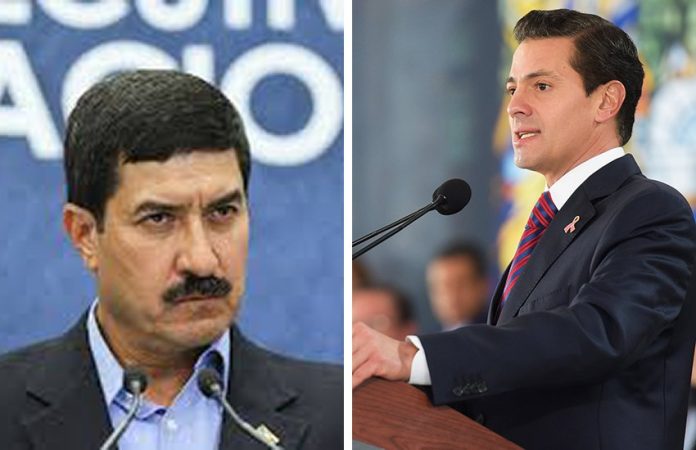With its days in office numbered, the administration of President Peña Nieto has made a last-minute and unprecedented attempt to protect itself from a corruption investigation in which federal officials could face prosecution.
The president’s legal office this month filed a motion with the Supreme Court that seeks to prevent officials from being targeted by a corruption probe in Chihuahua relating to the alleged diversion of public funds to the Institutional Revolutionary Party (PRI).
It is the first publicly known case in which the president’s legal office has sought to protect him and other officials in a corruption investigation, the Associated Press reported.
Authorities in Chihuahua are investigating a suspected embezzlement scheme, allegedly operated by Alejandro Gutiérrez, a former federal lawmaker and high-ranking official in the PRI, the same party Peña Nieto represents.
The scheme allegedly diverted 250 million pesos (US $13 million) from the federal Secretariat of Finance to the administration of former Chihuahua governor César Duarte. The money is believed to have been used to fund PRI candidates’ campaigns in the 2016 state elections.
Gutiérrez was arrested last December and placed in preventative custody but he was released last month after a challenge against his acquittal was rejected.
Duarte fled Mexico to the United States last year and is considered a fugitive from justice but the federal government has so far failed to extradite him.
After Gutiérrez’s exoneration and release, current Chihuahua Governor Javier Corral of the National Action Party (PAN) called the entire process a “pretense.”
“Corruption was not encapsulated in the states,” he said, adding it “rose to the federal level, touched officials from the government of Peña Nieto and Peña Nieto himself, and for that reason they have resorted to these acts of cynicism.”
In that context, the president’s legal office filed the motion against Corral and judicial authorities in Chihuahua to seek to block any “existing or imminent” legal actions against “current or prior federal public officials,” either “directly or indirectly [related] to the exercise of their duties.”
The Supreme Court received the filing on October 11 but it was not made public until the newspaper Reforma published its contents yesterday.
It is common in Mexico for public officials who are fearful of an investigation to attempt to seek legal protection — and any citizen has the right to do so — but the office of the president has never before sought that recourse from the nation’s highest court.
Corral, who has made investigating corruption during Duarte’s administration a central goal of his governorship, said the move is evidence that Peña Nieto is concerned about what the state-based investigation could uncover.
“It’s revealing that Peña feels he is at risk by the investigations or that he feels that he could be at risk by the Chihuahua investigations,” he told reporters yesterday.
“The president is worried about the investigations in Chihuahua and his concern can be put into context by a very old saying but with a new application: If he fears something it is because he owes something and in that sense, the recourse filed by the president indicates a concern for his future . . .” Corral said in a separate interview with Milenio Televisión.
Corral also said he believed that the motion filed is not appropriate in the circumstances, adding that it would fail.
“We don’t believe that a constitutional complaint . . . is the legally suitable instrument . . . it’s very questionable, we think that it won’t be successful,” he said.
The governor explained that the investigation in Chihuahua is looking at officials in the Secretariat of Finance (SHCP) but didn’t rule out that it could extend to other federal departments.
“It’s a diversion that is part of a multimillion-peso operation in which [the SHCP] and various other states participated. In the case of Chihuahua, that operation was investigated . . . [our] investigations directly touch the federal government, at the moment the Secretariat of Finance . . .” Corral said.
“On several occasions, I’ve pointed out that it’s difficult to believe that the president didn’t have knowledge of these diversions [of funds] that took place during March and April 2016 . . . they could have even been ordered by him.”
Cases of corruption have plagued Peña Nieto’s administration and analysts believe that it was one of the main reasons why Mexicans rejected the PRI en masse in the July 1 elections.
Among the scandals that have tainted Mexico’s ruling party during the president’s six-year term were the so-called Master Fraud embezzlement scheme, the government’s use of spyware to monitor its critics and the White House scandal in which Peña Nieto’s wife purchased a mansion built by a favored government contractor.
Ricardo Monreal, coordinator in the Senate of the soon-to-be ruling Morena party, said the president’s move to attempt to protect himself, his cabinet colleagues and other officials from potential prosecution isn’t a surprise.
“To me it seems normal, times have changed and all of us are now susceptible to being summoned [in relation to corruption investigations],” he said.
Source: Reforma (sp), Milenio (sp), Associated Press (en)
